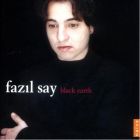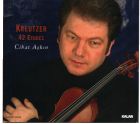Buy or gift a digital subscription and get access to the complete digital archive of every issue for just £18.99 / $23.99 / €21.99 a year.
Buy/gift a digital subscription Login to the Digital EditionAteş Orga on the piano recordings of Fazil Say
JS Bach French Suite No. 6 (BWV 817) in E major, talian Concerto (BWV 971) in F major, Bach-Liszt Prelude and Fugue (BWV 543) in A minor, Bach-Busoni Chaconne in D minor from Partita II (BWV 1004), Prelude and Fugue No. 1(BWV 846) in C major from the Well-Tempered Clavier Gershwin Fazil Say and the New York Philharmonic with Kurt Masur play many Gershwin favorites and a few surprises! Stravinsky Fazil Say plays both parts of the four-handed version of Stravinsky’s Le Sacre du Printemps (The Rite of Spring). Includes video footage of the artist (Mac/PC) Tchaikovsky: Piano Concerto No 1 Liszt: Sonata in B Minor St Petersburg Philharmonic Orchestra (Yuri Temirkanov)
“What matters to me is not who is playing on what instrument, but, rather, how the instrument is being played.” Now in his early thirties, Fazil Say is a force to be reckoned with. Big in Europe and America, as adulated in Turkey as her World Cup heroes, he is an original. Offering an extraordinary, frighteningly charged cocktail of Concorde-class pianism, dramatic delivery and passionate re-creative urge, he leaves you in no doubt of his sincerity – that and the fact he has something very personal to communicate. Alone on stage with his piano, stripped of PR hype, he caresses, consummates and conquers in tidal waves of emotional tension and physical release. Every performance he gives seems to be like so many minutes of autobiography, the music as much a means of personal confession as to convey the ideas of the composer. So raw is the privacy exposed, so wracked the body language (notwithstanding his publicity shots, he’s not in the smiling business), that for many concertgoers these footlight-crossing encounters can be uncomfortably upfront – maybe because they tell us something about ourselves, too.
His Warner/Teldec CDs are special. Purists may object to his “big-bone” romanticisation of Mozart, his liberties with Stravinsky, but the eloquence of playing, the sheer love of letting the modern concert grand speak unconstrained, is thrilling. Seeing music through images pictorial and programmatic, he relishes “orchestrating” his performances, giving a melody its head and dynamic, irrespective of style or convention. His Alla Turca climaxes in a stirring janissary canter. His Ah, vous dirai-je maman finds in Mozart’s nerve-ends the child being childish, pretending to be grown-up, the gate back to yesterday closed. Adding “prepared piano” effects, enriching the text, using variously microphoned sound balances, the four-hand version of Stravinsky’s Rite of Spring, with Say dubbing himself, is as primeval, overwhelming and rhythmically sword-edged as the best orchestral versions. “It’s a very free, very personal interpretation. I stand by every note of it,” he says.
As a boy growing up in Ankara, Say saw Bernstein play Rhapsody in Blue on television. “His is a sophisticated reading,” he says, “as though he were playing for a lover, late at night, sitting at the piano, a cigarette in his mouth and a glass of whisky in front of him.” The Gershwin collection evokes the mood. To have had Lenny’s favourite clarinettist, the legendary Stan Drucker, fronting the band, and his old New York orchestra on hand to beef up proceedings, must have seemed like a dream come true. Say doesn’t let them down, his brittle, jazzily energised fingers blurring the keyboard in what must have been red-hot sessions.
“When I play Bach, I have just one aim: to go beyond the wall. Paradise is over there.” From French suite and Italian concerto to German variation and mystic fugue, baroque economy to romantic elaboration, Say’s thoughtful Bach quietly provokes, with as many echoes of Glenn Gould as vistas of Golden Age pianism reborn. Imperially cohesive and tensioned, the Tchaikovsky and Liszt pose different challenges. The concerto is full of “contrasts between black and white, good and evil, supreme happiness and pain… a kind of ‘protest’”. The sonata is “akin to a stage production”, steeped in Faust, Teutonic myth and “the Romantic ideas and secret worlds” of its time. Both renderings scale the heights in terms defiantly individual, digging deeply, vocally into the sound. No second-hand music-making here, no one else’s ideas, simply the exultant, intimate, lonely journey of a man and his soul-searching.
Robert Ousterhout, who fell in love with the Kariye Camii, the Church of the Chora, 25 years ago. Here he makes an impassioned case for preserving this 14th-century masterpiece.
Brian Mathew pays tribute to the late Turhan Baytop, Turkey’s pre-eminent botanist
Most fast food is heavy, greasy and bad for your health. Güllaç pancakes, by contrast, are beautiful organza-thin leaves, light as a feather and made from the simplest ingredients. What’s more, they keep for an age. Berrin Torolsan sees the best gullaç in the making
Both were ambitious men with a penchant for poetry who suffered extremes of fortune. David Barchard charts the ties between two dominant figures in nineteenth-century Turkey, the British Ambassador Stratford Canning, and the Ottoman sultan Mahmut II
Wine is now the most popukar alcoholic drink on the planet, says Esat Ayhan, ‘and we in Turkey are benefitting from this positive wind.’ Owner for the past twenty-two years of a fashionable Cihangir şarküteri, stocking everything from De Cecco pasta to bacon and paté, Esat Bey took the opportunity to expand its renowned La Cave wine section into an entire floor devoted to the grape.
Francis Beaufort’s epic 1812 survey of Turkey’s southern coast and its classical sites sparked a European treasure hunt. It also very nearly cost him his life. By Nicholas Courtney with photgraphs by Kate Clow and James Mortimer
Max Fruchtermann (1852 –1918) was the publisher who took the postcard to Turkey and thereby took Turkey to the world. His cards sold by the million. Mert Sandalcı – historian, archivist and librettist – has assembled thousands of these cards into three mammoth volumes. Elizabeth Meath Baker leafs through their pages.
Wild apples, with their pink or white blossom in spring, are still a common sight in Turkey. They are collected in the autumn, when they ripen, and preserved for winter.
More cookery features
The pots of Alev Ebuzziya Siesbye have an ideal serenity and timeless beauty, as visitors to her retrospective in Istanbul have discovered. But their cool simplicity belies the passion that goes into creating them. Alistair McAlpine met the artist in Paris.

Fazil Say

Cihat Aşkin, violin. Produced by Ateş Orga

Cornucopia works in partnership with the digital publishing platform Exact Editions to offer individual and institutional subscribers unlimited access to a searchable archive of fascinating back issues and every newly published issue. The digital edition of Cornucopia is available cross-platform on web, iOS and Android and offers a comprehensive search function, allowing the title’s cultural content to be delved into at the touch of a button.
Digital Subscription: £18.99 / $23.99 (1 year)
Subscribe now